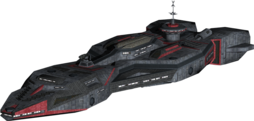| "Zephyr" Mk II Colonial Carrier
|
|
|
| Ship Class
|
Carrier
|
| Built by
|
Colonial Military
|
| Technical information
|
| Guns/Turrets
|
0 / 14
|
| Opt. weapon class
|
10
|
| Max. weapon class
|
10
|
| Other equipment
|
|
| Hull strength
|
827,000
|
| Max. shield class
|
10
|
| Cargo space
|
1,600 units
|
| Nanobots/Batteries
|
1550/1550
|
| Max. impulse speed
|
90 m/s
|
| Max. thrust speed
|
Thruster not available
|
| Max. cruise speed
|
350 m/s
|
| Power output
|
7,000,000 u
|
| Power recharge
|
220,000 u/s
|
| Additional information
|
| Ship price
|
$405,000,000
|
| Package price
|
$670,000,000
|
While the original Zephyr was outmatched by Outcast and Gallic capital ships, the Colonial Military quickly realised it did not have the resources to construct the newly designed Kronos class ships in sufficient numbers. Opting for flexibility over brute force, Colonial engineers set out to overhaul the obsolete Zephyr Carrier design, to turn it into a heavy support ship that relied on the successful Thanatos cruiser and the proven Nyx and Pytho strikecraft to deliver the punch.
The Zephyr Mk II visually looks much the same as the Mk I, but has undergone some radical changes underneath the hull plating. Reinforced bulkheads on known weakspots grant the ship increased durability. An improved reactor core provides enough power while being both more fuel efficient and smaller, freeing up room on the engineering deck for additional docking bays. A large number of defensive turrets dot the hull, providing good allround coverage against a wide range of enemies. A number of heavier turrets allow the craft to offer some direct firepower in fleet engagements, altough this is usually considered a last resort.
Handling
- This ship is too large to use docking bays, it must use mooring points.
Hardpoints
Purchase Includes
Availability
| Spoiler: Buying Locations
|
|
|
Origin
Modeled by Doom

